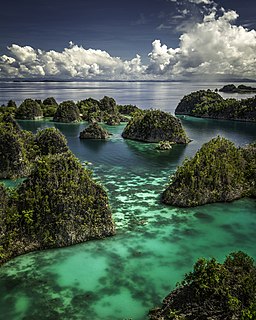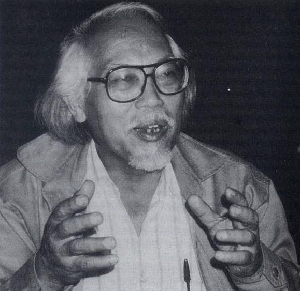Ignatius Sandyawan Sumardi is a former Jesuit priest, [1] closely linked to humanitarian activities in Indonesia after the Indonesian 1998 Revolution. [2]
Ignatius Sandyawan Sumardi is a former Jesuit priest, [1] closely linked to humanitarian activities in Indonesia after the Indonesian 1998 Revolution. [2]
Son of Andreas Sumardi (a retired police lieutenant) and Suzana, he was born in Jeneponto, South Sulawesi, as the youngest son of the family that depended on his father's modest salary. Following his father, Kuncoro, as Sandyawan was called during his childhood, was raised in different places, from Ujung Pandang (Provincial capital of South Sulawesi, now called Makassar) to Banjarnegara (where he finished the elementary school), to Bantul and Magelang (where he entered the seminary school of his own choice), and then, finally, he entered the seminary school in Yogyakarta. Since a very early age and especially during his period of study, Sandyawan developed an aspiration and life-mission to help the poor and others who were less fortunate. Sandyawan was ordained as priest in 1988.
Sandyawan started as an activist when he was in the seminary in Yogyakarta, in mid 1980s. He studied the life of the poor's by putting on disguise and blend into the people, so that they don't know that he's a priest.
He disguised himself as a sugar factory laborer in Kendal, Central Java. For one whole month, Sandyawan worked as a laborer. The next month, he disguised himself as a farmer laborer in a village in Wonosari. He also took the role of laborer around Jakarta. The longest time he has been in disguise is when he was a milk factory laborer in Cijantung. While in disguise, he was able to discuss and exchange conversations with the actual laborers about their problems.
While in Yogyakarta, he was active in educating and empowering the rickshaw drivers. He counseled homeless families in Indonesia. He also helped Father Mangunwijaya in the latter's work with the displaced people of Kedung Ombo.
Upon being ordained, Sandyawan joined Institut Sosial Jakarta, an NGO which was founded in 1985 by several Catholic priests and monks focusing on counselling laborers. Soon after, Sandyawan was appointed as Operational Director of the NGO.
In Indonesia his figure has become the focus of attention since the incident of 27 July 1996. While doing this he and his team continuously were hindered, mainly by those holding political/military power. Sandyawan's Independent Fact Finding Team, which intends to support those who become victims of brutal violence, mutilation and rape during the May 1998 riot, constantly have to face daily terrors and risk their lives.
Sandiawan decided to retire from priesthood to concentrate on social activities, such as supporting the people of Kampung Pulo. He was quoted as saying that he would rather be called "Bapak" (mister in Bahasa Indonesia, which also means "father") rather than "Romo" (how people address Catholic priests in Java, from "Father" in High Javanese). [3] He shared his experience supporting a poor community living by the Ciliwung River in the Asian Theology of Liberation Symposium in 2014. [4]

Tourism in Indonesia is an important component of the Indonesian economy as well as a significant source of its foreign exchange revenues. Indonesia was ranked at 20th in the world tourist Industry in 2017, also ranked as the ninth-fastest growing tourist sector in the world, the third-fastest growing in Asia and fastest-growing in Southeast Asia. In 2018, Denpasar, Jakarta and Batam are among of 10 cities in the world with fastest growth in tourism, 32.7, 29.2 and 23.3 percent respectively. The tourism sector ranked as the 4th largest among goods and services export sectors.

Prince Diponegoro, also known as Dipanegara, was a Javanese prince who opposed the Dutch colonial rule. The eldest son of the Yogyakartan Sultan Hamengkubuwono III, he played an important role in the Java War between 1825 and 1830. After his defeat and capture, he was exiled to Makassar, where he died, 69 years old.

Julius Darmaatmadja is an Indonesian cardinal of the Roman Catholic Church. He was created a cardinal in 1994, becoming the second Indonesian to be a cardinal. He served as the Archbishop of Semarang from 1983 to 1996 and Archbishop of Jakarta from 1996 to 2010.

The majority of Indonesia's railways are on Java, used for both passenger and freight transport. There are three noncontinuous railway networks in Sumatra while two new networks are being developed in Kalimantan and Sulawesi. Indonesia has finalized its plan for a national railway network recently. According to the plan, 3,200 km of train tracks that will criss-cross the islands of Sumatra, Java, Kalimantan, and Sulawesi, it has been touted as the most extensive railway project in Indonesia since its independence from the Dutch in 1945.

Petrus Josephus Zoetmulder S.J. was a Dutch expert in the Old Javanese language. He came from Utrecht and was associated with the Society of Jesus by 1925. He worked at Leiden University in the 1930s. His first work appeared in 1930 and he continued to write into the 1990s. He lived in Yogyakarta and was interred in the Jesuit necropolis at Muntilan, Java.

Herman Johannes was an Indonesian professor, scientist, politician and National Hero. Johannes was the rector of Universitas Gadjah Mada in Yogyakarta (1961–1966), Coordinator for Higher Education from 1966 to 1979, a member of Indonesia's Presidential Supreme Advisory Council from 1968 to 1978, and the Minister for Public Works and Energy (1950–1951). He was also a member of the Executive Board of UNESCO from 1954 to 1957.

TVRI, legally Lembaga Penyiaran Publik (LPP) Televisi Republik Indonesia is a public television network and the oldest television network in Indonesia. Its national headquarters is in Gelora, Central Jakarta.

The Catholic Church in Indonesia is part of the worldwide Catholic Church, under the spiritual leadership of the pope in Rome. Catholicism is one of the six approved religions in Indonesia, the others being Islam, Protestantism, Hinduism, Buddhism, and Confucianism. According to official figures, Catholics made up 3.12 percent of the population in 2018. The number of Catholics is, therefore, more than 8.3 million. Indonesia is primarily Muslim, but Catholicism is the dominant faith in certain areas of the country.

Yusuf Bilyarta Mangunwijaya, was an Indonesian architect, writer, and Catholic religious leader. He was popularly known as Romo Mangun.

Kyai Haji Ahmad Dahlan, often abbreviated to K.H. Ahmad Dahlan, was an Indonesian Muslim religious leader and revivalist, who established the Muhammadiyah organization. Which would become one of the largest muslim organizations in Indonesia, second only to the Nahdlatul Ulama. Born in Kauman, Yogyakarta, he was the son of an imam of a local mosque, and traced his origins from the lineage of the Prophet Muhammad. Ahmad Dahlan performed the Hajj pilgrimage when he was 15 years old, and he lived in Mecca for another five years.
Mgr. Leo Soekoto, SJ was Archbishop of Jakarta from 15 August 1970 to his death. He was appointed priest on 22 August 1953 at the age of 32 years.

The Roman Catholic Archdiocese of Semarang is a Metropolitan Latin archdiocese on Java in Indonesia, yet it depends on the missionary Roman Congregation for the Evangelization of Peoples.

Taman Sari Water Castle, also known as Taman Sari, is the site of a former royal garden of the Sultanate of Yogyakarta. It is located about 2 km south within the grounds of the Kraton, Yogyakarta, Indonesia. Built in the mid-18th century, the Taman Sari had multiple functions, such as a resting area, a workshop, a meditation area, a defense area, and a hiding place.

Ignatius Suharyo Hardjoatmodjo is an Indonesian prelate of the Catholic Church. He has been Archbishop of Jakarta since 2010, after serving as Archbishop of Semarang from 1997 to 2009. He is commonly known as Archbishop Suharyo.

Monsignor (Mgr.) Vincent Sutikno Wisaksono, Pr. is the current Bishop of Surabaya. He has held the position since 29 June 2007, replacing Mgr. John Sudiarna Hadiwikarta, Pr. who died on December 13, 2003, creating a vacancy in the Diocese of Surabaya. His motto as a bishop is "Ego veni ut vitam habeant, et abundantius habeant.", which means "I have come that they may have life and have it in all its abundance".

The Reformed Evangelical Church of Indonesia, abbreviated GRII, also Indonesian Reformed Evangelical Church, is a Reformed Christian church that is headquartered in Jakarta, Indonesia. It was founded by Stephen Tong, a Chinese-born Indonesian evangelist. The church's members are mainly Indonesians of Chinese descent.
Akhudiat was an Indonesian poet, playwright, and humanist.

Albertus Soegijapranata, SJ, better known by his birth name Soegija, was a Jesuit priest who became the Apostolic Vicar of Semarang and later its archbishop. He was the first native Indonesian bishop and known for his pro-nationalistic stance, often expressed as "100% Catholic 100% Indonesian".
2016 (MMXVI) was a leap year starting on Friday of the Gregorian calendar, the 2016th year of the Common Era (CE) and Anno Domini (AD) designations, the 16th year of the 3rd millennium and the 21st century, and the 7th year of the 2010s decade.